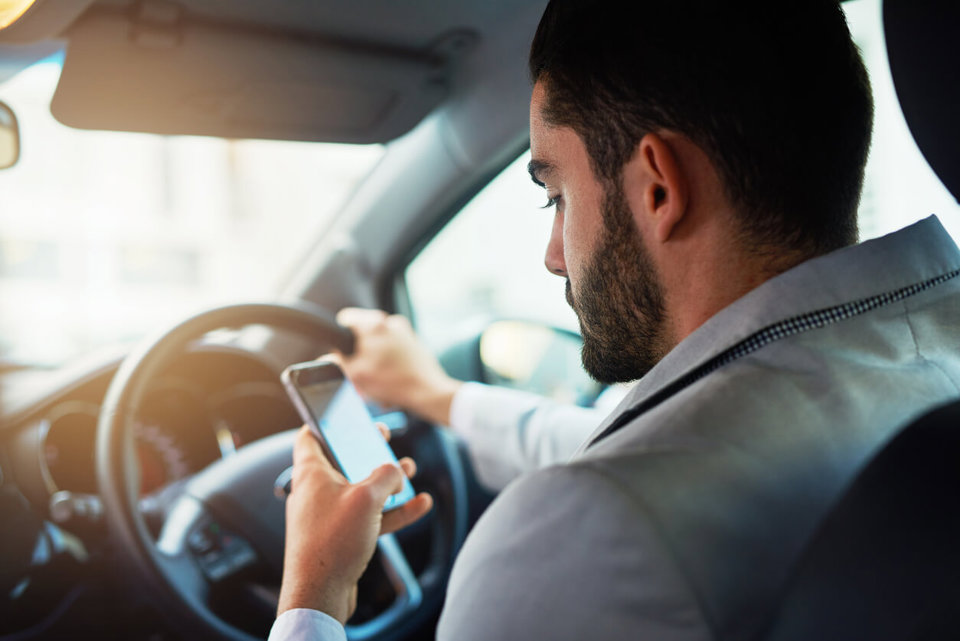A substantial body of research shows that using a hand-held or hands-free mobile phone while driving is a significant distraction, and substantially increases the risk of the driver crashing.
High mileage and company car drivers are more likely than most to use a mobile phone while driving. Some employers provide mobile phones or reimburse the cost of work-related calls made on private ones. There are good business reasons to do so. There are also good health and safety reasons for lone workers and staff who travel in areas where summoning help (if they break down, for example) may be difficult.
But, this should not mean that staff should use the phone while driving. Drivers who use a mobile phone, whether hand-held or hands-free:
• Are much less aware of what’s happening on the road around them
• Fail to see road signs
• Fail to maintain proper lane position and steady speed
• Are more likely to ‘tailgate’ the vehicle in front
• React more slowly and take longer to brake
• Are more likely to enter unsafe gaps in traffic
• Feel more stressed and frustrated
Research indicates that they are also four times more likely to crash, injuring or killing themselves and/or other people.
Using a hands-free phone while driving does not significantly reduce the risks either because the problems are caused mainly by the mental distraction and divided attention of taking part in a phone conversation at the same time as driving.
The Law
Hand-held Phones: It is illegal to use a hand-held mobile phone while driving. It is also an offence to “cause or permit” a driver to use a hand-held mobile phone while driving. Therefore, employers can be held liable as well as the individual driver if they require employees to use a hand-held phone while driving.
Hands-free Phones: It can be illegal to use a hands-free phone while driving. Depending upon the individual circumstances, drivers could be charged with ‘failing to have proper control of their vehicle’.
In more serious cases, the use of any type of mobile phone could result in prosecution for careless or dangerous driving.
The police may check phone records when investigating fatal and serious crashes to determine if use of the phone contributed to the crash.
Employers who require staff to use any mobile phone while driving for work could be prosecuted if an investigation determined that such use of the phone contributed to a crash. Claims in the civil courts could also result.
What employers should do?
Ensure all staff, including senior managers and line managers, understand that the organisation expects everyone who drives for work to drive safely for their own, and others’ benefit.
Ensure that staff and/or their safety representatives are fully consulted about the organisation’s policy on mobile phones and driving and that this is reviewed periodically in joint health and safety committee meetings.
As part of recruitment, training and staff appraisal, ensure that drivers and line managers are reminded about:
• The dangers of using a hand-held or hands-free mobile phone while driving
• The organisation’s policy on mobile phone use
• The need to go to voicemail, or to switch the phone off while driving, and to stop in a safe place to check messages, or to allow a passenger to use the phone
• That good communication can easily be maintained without using a phone while driving
• The importance of line managers not expecting staff to make or receive calls when driving
• The legal, financial and bad PR consequences that could result from using a mobile phone while driving
In particular, emphasise that staff should never make or receive calls on a mobile phone, or use any similar device, while driving.
Senior managers, from the head of the organisation down, should lead by personal example by not using a mobile phone while they are driving themselves.
Ensure that journey plans include time and places to stop for rest and refreshment, and to check messages and return calls.
Review work practices to ensure they do not pressurise staff into making or receiving calls when driving.
Require staff who are involved in any crash or damage-only incident when driving at work (in their own, a hire or company vehicle) to report this to their line manager. Check if the driver was using a mobile phone and what (if any) action is necessary to prevent repeat occurrences. If the company provides the phone, a check could be made against the phone bill.
Interview staff who have been identified as using a phone while driving, or been involved in a crash, to establish the details and to identify what lessons can be learned.
The approach should be positive and helpful, rather than punitive, although it should be made clear that further incidents may lead to disciplinary procedures. Consider if driving training would help.
Make it clear to staff that the organisation will co-operate with police enquiries resulting from a crash and will supply to the police all relevant information on the employee to whom the vehicle is allocated or if someone else was driving at the time, their details.
Managers should discuss this issue with their drivers during periodic staff appraisals and team meetings. It should form part of an individual employee’s performance appraisal, leading, where appropriate, to new personal performance targets. Staff should be encouraged to report any pressure from managers or customers to use a phone while driving.
















Login to comment
Comments
No comments have been made yet.